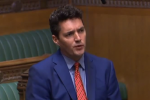
On 4 October, the Prime Minister announced Network North – this Government’s transport investment vision to drive better connectivity across the North, the Midlands and the country with faster journey times, increased capacity and more frequent, reliable journeys across rail, buses and roads.
As part of this plan, we will deliver HS2 between Euston in central London and the West Midlands as planned, with new stations at Old Oak Common and Birmingham Interchange. HS2 tracks will end with two branches in the north – one to Curzon Street station in central Birmingham, and one to Handsacre, near Lichfield, where HS2 trains for Manchester, Liverpool and Scotland will join the West Coast Main Line. At Euston, we will appoint a development company, separate from HS2 Ltd, to manage the delivery of the station and of an ambitious, redeveloped ‘Euston Quarter’ – potentially offering up to 10,000 homes.
HS2 is now well into the build and construction phase, with around 350 active construction sites. Thousands of engineers and construction workers are on these sites, above and below the line, building and constructing our new railway. High-speed services remain on track to commence between 2029 and 2033, running initially between Old Oak Common in west London and Birmingham Curzon Street.
Overall journey times will improve with HS2. High speed trains will run from Euston to central Birmingham in 49 minutes, 30 minutes faster than now; from Euston to Manchester in 1 hour 40 minutes, 27 minutes faster than now; and from Euston to Liverpool in 1 hour 45 minutes, 26 minutes faster than now. This new railway will have a transformative effect on rail capacity, nearly allowing up to 250,000 passengers to travel every day – supporting growth for decades to come.
The benefits are clear, but it is also right we recognise that the HS2 programme currently accounts for over one third of all the Government’s transport investments, preventing us from spending on people’s genuine priorities and doing little to improve the journeys that people make the most. So, rather than delivering HS2 Phase 2a, HS2 Phase 2b Western Leg and HS2 East, the Government is redirecting £36 billion funding to invest in hundreds of transport projects across the country – with every region set to receive the same or more transport investment on an unprecedented scale as a result of the change.
Communities in towns, cities and rural areas will see improved transport infrastructure far sooner through £19.8 billion reinvested in the North, including:
- £2 billion for a new station at Bradford and a new connection to Manchester;
- £2.5 billion to deliver a new mass transit system in West Yorkshire;
- Upgrading the Energy Coast Line between Carlisle, Workington and Barrow, which will enable a half-hourly service between Carlisle, Workington and Whitehaven and accommodate major new freight demands from the new coal mine
- Nearly £4 billion more funding for local transport in the North’s six city regions
- A new £2.5 billion fund for local transport across all areas in the North outside the six city regions – smaller cities, counties, towns and countryside
- A new £3.3 billion fund for road resurfacing;
- Other landmark investments in roads, reopened train lines and new stations.
Our plans for Network North will see a significant investment in east-west rail connections in the North. Northern Powerhouse Rail will now be even more ambitious and connect nine of the North’s biggest towns and cities with faster, more frequent electrified services. This includes electrification of routes between Hull and Leeds, Sheffield, and Manchester meaning faster and more frequent services for Hull to many parts of the North of England. We will also invest a further £12 billion to better connect Manchester to Liverpool, which would allow the delivery of Northern Powerhouse Rail as previously planned, including high-speed lines, and we will work with local leaders to agree whether they wish to suggest other ways to achieve the objectives within that cost envelope.
In parallel, delivery is well underway on the Transpennine Route Upgrade - a project we are delivering at a greater cost than Crossrail, and that will see us fully electrify and upgrade the Transpennine Mainline between Manchester, Leeds and York.
£9.6 billion will be reinvested in the Midlands:
- Funding the Midlands Rail Hub in full with £1.75 billion, connecting 50 stations and over 7 million people – doubling capacity and frequency;
- Over £1.5 billion guaranteed local transport funding for the new East Midlands Mayor;
- Over £1 billion extra local transport funding for West Midlands City Region;
- A new £2.2 billion fund for local transport across all areas in the West and East Midlands outside the city regions – smaller cities, counties, towns and countryside
- Reopened train lines and new stations such as the Ivanhoe Line;
- The development of Midlands road schemes to benefit businesses and their employees at Rolls Royce, Toyota, and Magna Park, generating over £12 billion for the local economy.
Finally, £6.5 billion will go to the rest of the country. Here in the South East, we will have access to a £2.8 billion roads resurfacing fund to combat the potholes causing misery for drivers across our region.
To ensure regions are best equipped to reach their productivity potential, local authorities and Metro Mayors will be empowered to create the public transport networks that their communities want to see. We will also set out a broader package of infrastructure planning reforms in the coming months to remove burdens to building to ensure these projects are delivered and benefits felt in communities more quickly.



